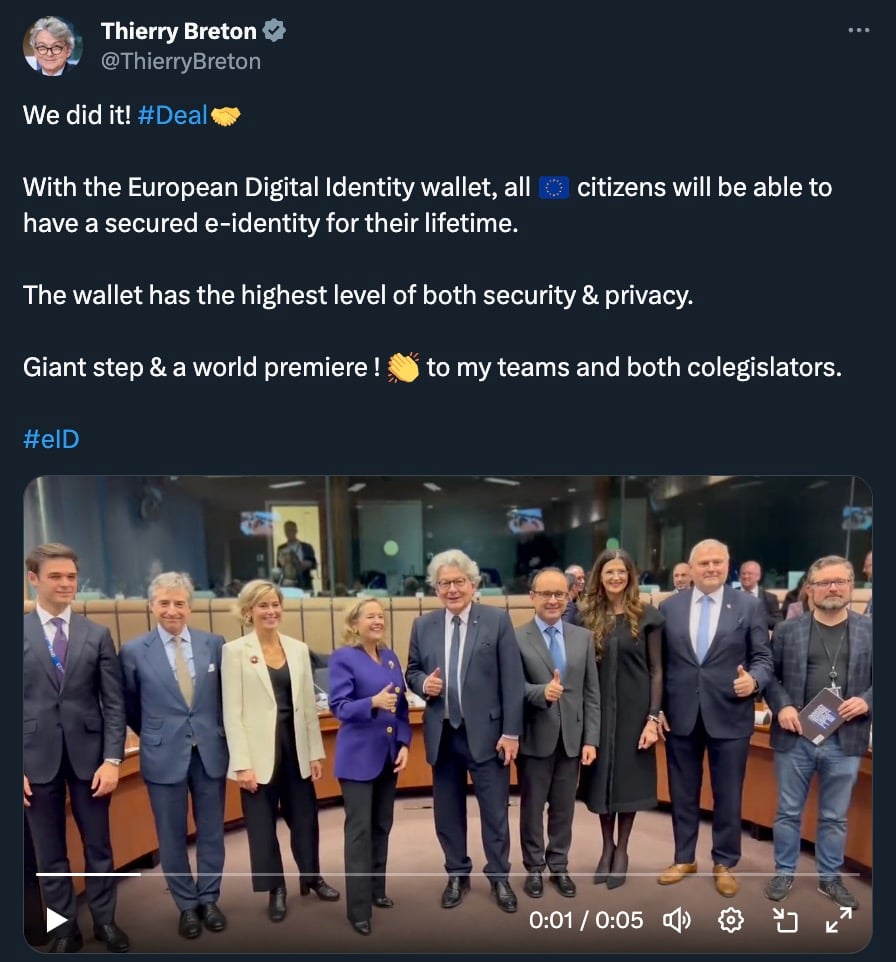The European Parliament (EP) and the bloc’s member-countries have reached a provisional agreement on the eID digital ID framework. Shortly after, as if planned, the EU Commissioner for Internal Market, Thierry Breton indicated its usefulness for CBDC (central bank digital currency) integration.
The provisional agreement on the so-called eID (European Digital Identity) regulation is presented by the EU Council, which collaborated on the agreement together with the EP, as a supposedly safe and trusted option which “protects democratic rights and values”.
Meanwhile, opponents to the agreement have said that privacy and security considerations haven’t been taken seriously. Specifically, Dutch MEP Rob Roos, took to X to announce the news as “very bad”. According to Roos, in the process of striking a deal, both institutions “ignored all the privacy experts and security specialists.”
🧵 IMPORTANT THREAD: “I just left the room where we had negotiations about the digital identity—and I have bad news,” announced Dutch Member of the European Parliament @Rob_Roos on Wednesday.
On X, in a post attached with a video, he wrote:
BREAKING: Very bad news. The European… pic.twitter.com/7RAhOX0q59
— The Vigilant Fox 🦊 (@VigilantFox) November 8, 2023
Exactly after the announcement, the widely unpopular pro-censorship Commissioner, Thierry Breton, acted without a moment’s notice to say that a Digital ID Wallet exists, noting “we have to put something in it”. The frantic post moments after the announcement might be seen as an attempt to build momentum for what Bittrex CEO, Oliver James Linch, described as “a solution in search of a problem“.
In his post on X, Breton was in a festive mood, congratulating those who worked on this outcome – all unbeknownst to the general public – calling it “a giant step and a world premiere.”

According to Breton, who has no experience in high-tech security matters, the proposition guarantees top levels of security and privacy while offering EU citizens “a secured e-identity for their lifetime.”
Roos, however, believes that something can still be done about this disconcerting turn of events, since the EP has yet to vote on the agreement. Roos is urging citizens to contact their respective MEPs and tell them they oppose the looming regulation, and that they expect MEPS to vote against it in defence of European values.
This refers to the eIDAS Regulation which will encompass mutual recognition of eID schemes across the EU.
Last week, it was reported that as many as 300 scientists, security experts and researchers agreed that the bloc should “rethink” its plans.
Firefox Internet browser maker Mozilla put it this way:
This enables the government of any EU member state to issue website certificates for interception and surveillance which can be used against every EU citizen, even those not resident in or connected to the issuing member state. There is no independent check or balance on the decisions made by member states with respect to the keys they authorize and the use they put them to.
Other experts warned: “as proposed in its current form, will not result in adequate technological safeguards for citizens and businesses, as intended. In fact, it will very likely result in less security for all.”
In particular, the comments refer to the newest version of eIDAS “radically expanding the ability of governments to surveil both their own citizens and residents across the EU by providing them with the technical means to intercept encrypted web traffic, as well as undermining the existing oversight mechanisms relied on by European citizens.”
Following this provisional agreement, the European Union appears to have adopted a strategy of pursuing controversial policy while bypassing proper public discussion and ignoring experts in the field. If nobody kicks up a fuss due to not being informed, or simply not understanding the profound consequences of such rule-changing, then the proposed policy is treated as if it’s democratically approved.
Did you enjoy the article? Share it!


